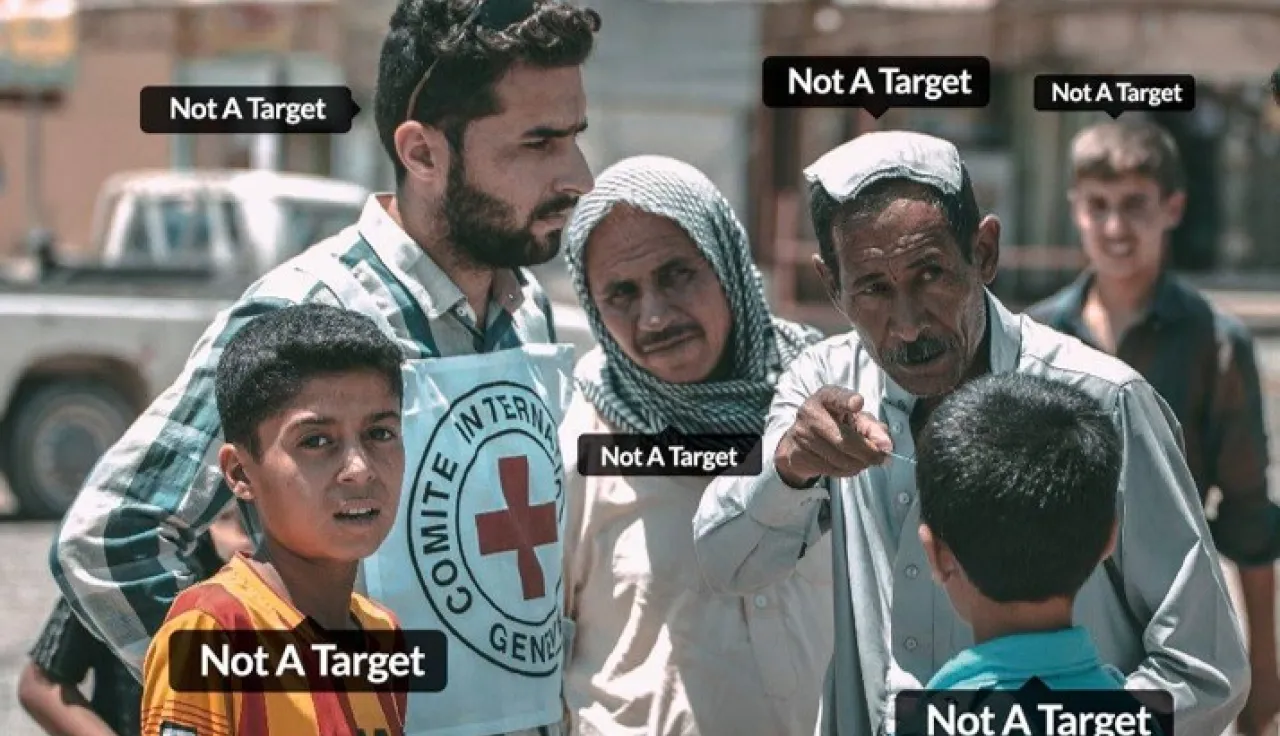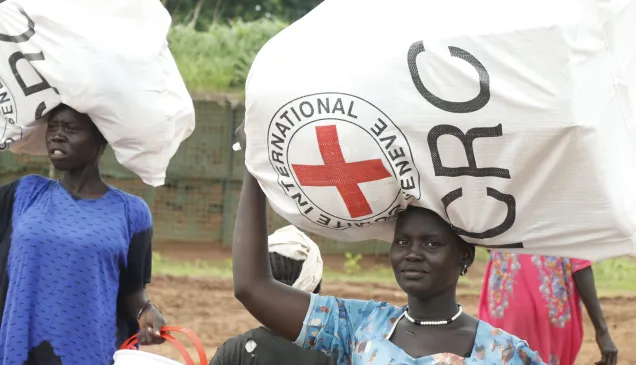Dear colleagues, there is perhaps no greater concern for the ICRC than the protection of civilians and ensuring respect for international humanitarian law. On the frontlines the ICRC sees only too closely what happens when IHL is violated: prisoners tortured and killed, aid workers murdered, civilian areas indiscriminately shelled.
The critical question remains how can we move beyond our outrage to action?
The ICRC and Switzerland have been leading a formal process with states on Strengthening Respect for IHL in the lead up to the 33rd International Conference of the Red Cross Movement next year. This will be a key moment to reinforce support for international humanitarian law, in a non-political, voluntary and consensus-based way. We have been encouraged by the active participation of states in the process and we ask that the members of the international community be ambitious in their commitments.
The dynamics of conflict have undergone rapid and deep transformation in the last few years. And the result we are seeing is more people are affected, for a longer time, with deeper needs, from food, water and shelter, to health care services and economic opportunities. Conflicts and protagonists cross State borders. Conflicts are protracted. Battles are fought in populated areas, risking too many civilian lives and destroying critical infrastructure. A vast array of armies, Special Forces, armed groups, and criminal gangs now fight – directly or by proxy, openly or secretly. ICRC research shows more armed groups have emerged in the last six years than the previous six decades.
Wars often involve partners and allies – leading to a dilution of responsibility, fragmentation of command chains and an unchecked flow of weapons. This only increases the climate of impunity and ultimately causes yet more suffering. Partnering is a risky strategy, too for States – from political and reputational risks, and the danger that their support is redirected, or used in violation of IHL.
In this environment, we need new ways to influence the behaviours of belligerents. I see there are new opportunities to work differently two groups in particular: non-state armed groups and with States supporting parties to conflicts.
The ICRC is mandated to talk to all parties to a conflict and strives to engage with an increasingly complex array of non-state armed groups. Currently we are in contact with around 200 groups worldwide linked to our operations or our humanitarian concerns; and we are discovering that the structure of these groups mean we need new approaches.
Our innovative new research on the factors that lead to restraint in war has provided us unprecedented evidence on how members of State and non-State armed groups are influenced. The results confirm our approach that training in IHL for traditional, top down, State armed forces makes a difference to battlefield conduct.
... but, it also found that a different approach is needed for decentralised groups, especially non-state armed groups. These groups are influenced by command structures but also by many other factors - community, political, spiritual. We need to do more on influencing these networks and on informal levels. While the law is vital in setting standards, the report recommends the ICRC encourage the internalisation of the rules into the identity of combatants, to move beyond 'it is against the rules' to values such as 'it is not who I am'.
Dear colleagues, As the trend towards allied and partnered warfare only increases, I am convinced this presents us with a new opportunity: there is an untapped potential for States to positively use their influence to better protect the victims of armed conflict.
We have designed an agenda for action, based on our analysis from the field, which sets out practical steps States can take to help parties they support behave in ways that comply with the law, to set up safeguards, and take mitigating measures. Few acts of support pose a greater risk to victims of armed conflict than the provision of arms. States that support parties to armed conflict must not transfer weapons if there is a clear risk of violations of international law.
Other steps include:
- Giving proper instruction in the rules of armed conflict;
- Ensuring constant oversight of allies' conduct, for instance in military operations;
- Clarifying responsibilities, on lines of authority, procedures for the protection of victims of armed conflict and communication channels;
- Vetting recruits, including to excluding recruitment of people under 18 years of age or those who have committed violations of IHL or other serious crimes;
- Training and supporting allies to treat detainees humanely, to provide them with judicial guarantees and allow the ICRC to visit people deprived of their liberty.
We aim to further understand the challenges in implementing these practical measures, and refine our recommendations, by exchanging practice and lessons learned with States
Dear colleagues, we must guard against the great human suffering that comes with IHL violations and any kind of impunity for them, or of calling into question our humanitarian values. No matter how complex, protracted or fragmented an armed conflict may be.
It is the task of the international community not to let out outrage turn to inertia but to take practical steps to prevent the suffering of civilians in conflicts around the world.
Ten practical recommendations to States supporting parties to conflicts:
- Add safeguards to arms transfers. Few acts of support pose a greater risk to victims of armed conflict than the provision of arms. Yet weapons transfers are at their highest levels since the end of the Cold War.
States that support parties to armed conflict must not transfer weapons if there is a clear risk of violations of international law. They must ensure that recipients are fully trained in using and storing the weapons in a responsible manner.
With the numerous attacks on health care, we ask all States to uphold international commitments and make the protection of health care by their partners and themselves a priority. - Train and instruct. Proper instruction in the rules of armed conflict must be adapted to the language and education of the combatants and repeated regularly. Instruction in lawful behavior under IHL should also draw from other relevant legal frameworks such as Islamic law.
- Ensure protection of detainees. States should train and support parties to conflicts to treat detainees humanely, to provide them with judicial guarantees – a particular challenge in the case of non-State armed groups – and allow the ICRC to visit people deprived of their liberty.
- Vet recruits. Recruitment must exclude: people under 18 years of age and those who have committed violations of IHL or other serious crimes. It should also be limited to individuals - not entire groups or only the commander of the group- and be voluntary and free.
- Highlight reputational risks and benefits. States should appeal to parties' values and awareness of their own reputation to encourage them to respect IHL and explain that it is ultimately in their interest to do so.
- Clarify responsibilities. Ambiguity increases the risks of violations, particularly when multiple actors are involved. Clarity can minimize risk. This applies to lines of authority, procedures for the protection of victims of armed conflict and communication channels.
- Provide constant oversight. States must keep monitoring their protégés' conduct, for instance during the planning and execution of military operations. They should carry out joint reviews of past operations and directly engage with all those who were affected so that an assessment can be made of the conduct of the parties to the conflict. They should also consider information provided by external monitoring bodies, and encourage parties to the conflict to engage with neutral and impartial humanitarian organizations, such as the ICRC.
- Improve accountability. States should implement clear procedures for themselves and their partners to collect allegations of violations, investigate them, and provide support to the competent authorities to address the issues.
- Set clear rules and procedures. States should help strengthen: rules and procedures regulating armed group's behaviour towards the civilian population, rules of engagement and detention, and ensure that the armed group has a strong chain of command. Whenever possible, they should help the State where the armed group operates to integrate and oversee the group.
- Implement an exit strategy. To minimize risks once a conflict is over, States should outline plans for the demobilization, disarmament and reintegration of members of an armed group, ensure that weapons are accounted for, and also take measures for the protection of these members and their families against retaliation.




